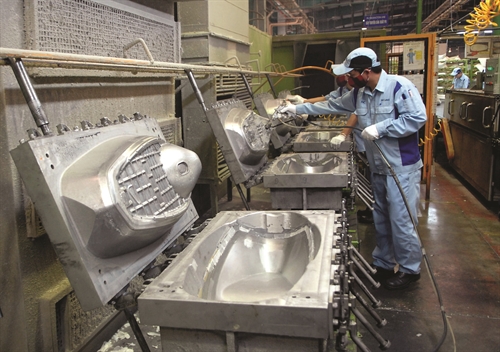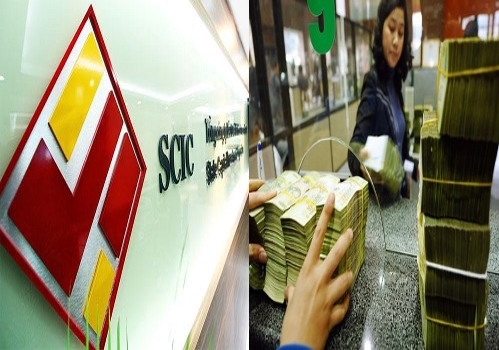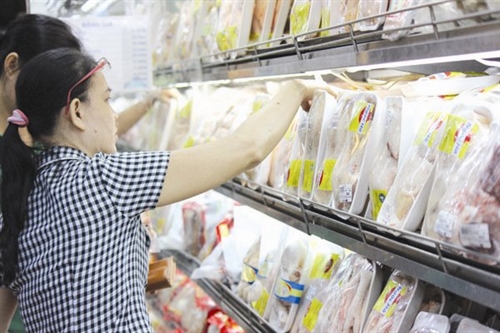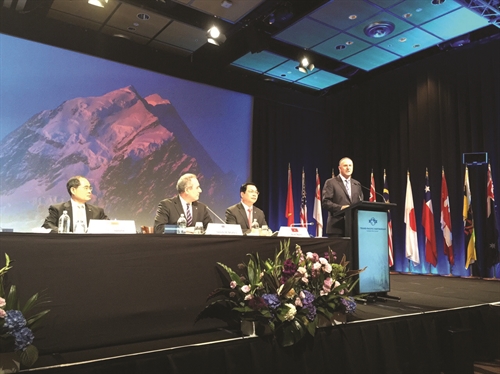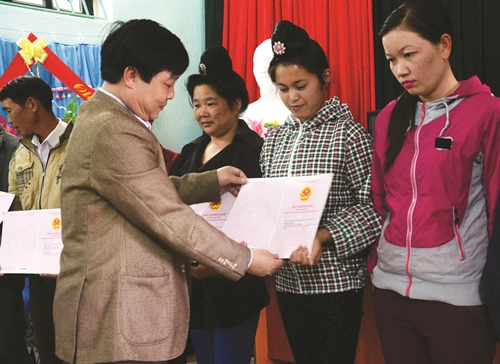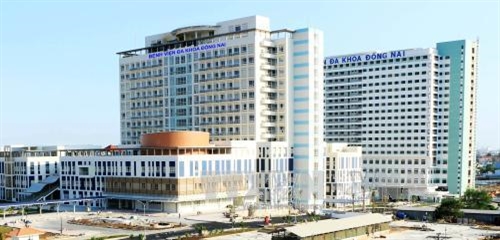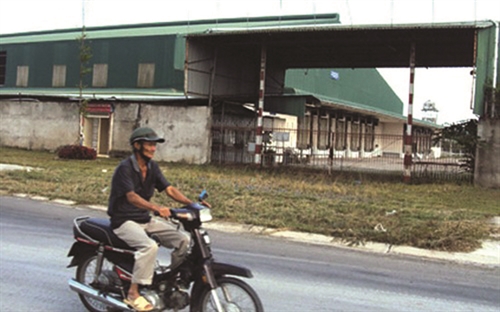The Government will try its utmost to create a favorable environment for the development of businesses.
This pledge is explicitly expressed in Resolution No. 35/2016/NQ-CP on supporting and developing enterprises over the next five years, which was inked by Prime Minister Nguyen Xuan Phuc on May 16, just half a month after his first meeting with the business community in the capacity as a new cabinet leader.
The Resolution sets an ambitious target that by 2020, the country will have at least one million enterprises, doubling the current number. The private sector will contribute 48-49 percent of the gross domestic product (GDP) and 49 percent of total social investment. The total factor productivity (TFP) will account for 30-35 percent of GDP while the social labor productivity will annually increase five percent. Around 30-35 percent of local businesses will engage in creative and innovative activities every year.
Resolution 35 sets principles which must be adhered to in the process of developing and improving economic institutions to create a favorable environment for enterprises to prosper and become a driving force for the economy.
The Resolution reiterates the principle that the State will protect citizens’ and businesses’ lawful property rights and right to freedom of enterprise. Enterprises may do business in all sectors and trades which are not banned by law.
The State will pursue the policy of serving enterprises and creating favorable conditions for their investment and business activities in the formulation, issuance and implementation of laws and regulations concerning enterprises.
The State will guarantee the stability, consistency and predictability of its policies, stabilize the macro-economy and build a favorable, safe and friendly business environment.
At the same time, it will ensure equal access to funding sources, land and natural resources among enterprises, regardless of their types and economic sectors.
Particularly, it will adopt policies to back small- and medium-sized enterprises (SMEs), startups and creative and high potential businesses, the Resolution says.
In order to attain the above targets, the Resolution assigns specific tasks to cabinet agencies and local administrations, focusing on administrative reform, support for startups, creation of a level playing field for enterprises of all economic sectors, and reduction of taxes, charges and fees imposed on enterprises.
Accelerating administrative reform
In fact, this is not the first time business environment improvement is mentioned as a top priority. Since 2014, the Government has issued three resolutions, all numbered 19, specifying tasks and solutions to improve the business environment and raise national competitiveness. However, achievements remain below expectations. Minister of Planning and Investment Nguyen Chi Dung admitted that two years after the adoption of the first Resolution 19 in 2014, not much change has been seen.
“The private sector was still facing numerous difficulties in access to resources as well as state support,” he said.
Following the spirit of “doing to the utmost” to improve the business environment, the Government instructs ministries, sectors and local administrations to spare no effort to accelerate administrative reform under Resolution 19 of 2016 and speed up the building of an e-government under Resolution 36a of 2015.
 |
| Motorbike assembly line of Japan-invested Vietnam Suzuki Corp (Visuco) in Loteco industrial park (Dong Nai province) __Photo: Danh Lam/VNA |
With a view to reducing businesses’ time and money spent to fulfill administrative procedures, the Resolution urges state agencies and local administrations to make public on their websites all necessary business-related information such as processes for carrying out procedures, business conditions, results of settlement of enterprises’ petitions and complaints, etc. Provincial administrations must also establish hotlines and create ask-and-answer sections on their e-portals for receiving and answering inquiries of enterprises. Additionally, provincial-level People’s Committee chairpersons are asked to hold dialogues with local businesses at least twice a year, as a channel for local leaders to know and remove in time difficulties and troubles facing enterprises operating in their localities.
The Resolution also says that heads of local administrations will be responsible for implementation of the single-window mechanism in their localities. Enterprises will no longer need to run here and there to fulfill administrative procedures. They will instead submit their dossiers to a focal-point agency and wait for a reply from such agency. In case their dossiers need to be further modified or supplemented, that agency will summarize all requirements from related agencies and notify them to the enterprises at a time only.
Creating favorable environment for startups and creative businesses
Speaking at the meeting between Prime Minister Nguyen Xuan Phuc and the business community in late April, Chairman of the Vietnam Chamber of Commerce and Industry Vu Tien Loc proposed the Government to design programs to boost startups, encourage business households to transform into enterprises, and shift informal economic activities into formal ones on a broad scale.
In response to the business community’s opinions, the Government assigns the Ministry of Planning and Investment to work with other related ministries and sectors to evaluate the implementation and effectiveness of existing support policies for enterprises, especially those for startups and creative businesses, and on that basis, to make necessary adjustments.
Accordingly, measures will be taken to accelerate the allocation of funds from the Small- and Medium-Sized Enterprise Development Fund, the National Technology Renewal Fund and private funds to startups, especially creative and high potential ones. The possibility of forming and operating business incubators, business support centers and startup programs in the form of public-private partnership with the participation of business associations, organizations and individuals at home and abroad will also be considered. Meanwhile, mechanisms will be adopted to support and encourage business households to transform themselves and register operation in line with the Enterprise Law.
The Ministry of Planning and Investment is also tasked to devise a plan to strengthen the Council for Encouragement of Development of Small- and Medium-Sized Enterprises right in this year. Instead of being headed by the Minister of Planning and Investment as at present, the Council will have the Prime Minister as its chairman and representatives from state agencies and the business community as its members. These changes are expected to enable the Council to fulfill its role of regulating and supervising the implementation of SME support policies and programs nationwide.
Easing enterprises’ access to resources
At present, private enterprises, especially SMEs, have limited opportunity to access such resources as capital, land, etc. To redress the situation, the Resolution assigns specific tasks to ministries, sectors and localities.
Specifically, the Ministry of Finance will review and propose to the Government right in the third quarter of this year amendments to regulations on credit guarantee for SMEs through the Vietnam Development Bank and local credit guarantee funds for SMEs.
The Ministry of Industry and Trade will mull and propose appropriate mechanisms and policies to attract domestic and foreign investors to pour money into the construction of industrial clusters to home SMEs and rural businesses.
The Ministry of Natural Resources and Environment will revise the current land law toward allowing industrial park infrastructure developers to use land use rights as collaterals to borrow bank loans or raise long-term capital. It is also assigned to work out policies to ease enterprises’ access to land in industrial parks and clusters, allowing SMEs to pay land rental according to flexible schedules suitable to their land use demand.
The Ministry of Science and Technology will devise concrete measures to help enterprises borrow loans from the National Technology Renewal Fund and other state support programs and effectively use such loans to raise their technological level and competitiveness.
The Ministry of Justice will amend regulations on secured transactions to create favorable conditions for enterprises to pledge assets to borrow capital.
The State Bank of Vietnam will direct credit institutions to review and simplify the lending process, abolish burdensome procedures for customers while still ensuring safety and law compliance. Together with designing loan schemes with reasonable interest rates, diversifying banking products and services, banks are instructed to raise their loan appraisal capacity so as to shorten the time for processing loan applications.
Ministries, sectors and localities will also join hands with one another to support enterprises to form sector-based associations and value chains, creating conditions for local businesses to associate with big enterprises and foreign-invested enterprises.
The Resolution asserts that the State will continue selling its capital portions at enterprises at which it no longer needs to hold capital, even at highly profitable ones, while creating opportunities for the development of private enterprises and SMEs through providing support services such as training, consultancy, information, etc.
Reducing taxes, charges and fees imposed on enterprises
With a view to helping businesses reduce production costs, the Prime Minister requests the Ministry of Finance to mull plans on reduction of corporate income tax for SMEs and consider cutting personal income tax for workers in certain fields. Tax, tax administration and customs regulations will be harmonized to reduce compliance costs for businesses. The Ministry of Finance will work with other ministries and sectors in revising the land law in the direction of reducing land rentals, expenses for change of land use purposes and other land-related costs for enterprises.
The Government will consider allowing enterprises to subtract capacity building, consultancy service, advertising and marketing expenses from corporate income tax-liable income.
Tolls for roads and bridges, including also those invested in BOT form, will be reasonably adjusted so as to help businesses, especially transport service providers, cut production costs. Meanwhile, regulations on ocean shipping charges and surcharges will be revised toward transparency and conformity with international practices.
To protect lawful rights and interests of businesses, the Resolution requires the Government Inspectorate to work with the State Audit Office of Vietnam and other related agencies to review and amend the current inspection and audit laws. It instructs that inspection, examination and audit plans be integrated with one another and notified in advance to enterprises so as to avoid overlap. Particularly in the area of tax administration, state agencies will not be allowed to conduct inspection and examination unless they have sufficient grounds required by law.
Meanwhile, the Ministry of Public Security is assigned to revise regulations on security and social order to facilitate the exercise of business rights, severely punish violating businesses while refraining from criminalizing economic and civil relations. All these efforts aim at creating an equal, healthy and safe environment for enterprises to operate in a lawful manner.- (VLLF)
